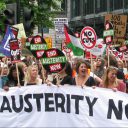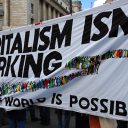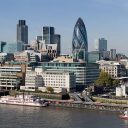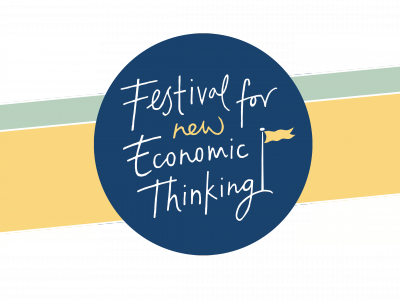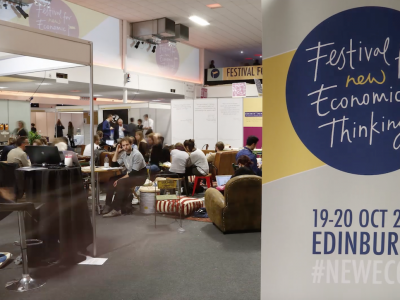Fixing the madness in the method: How the OECD is challenging its market models
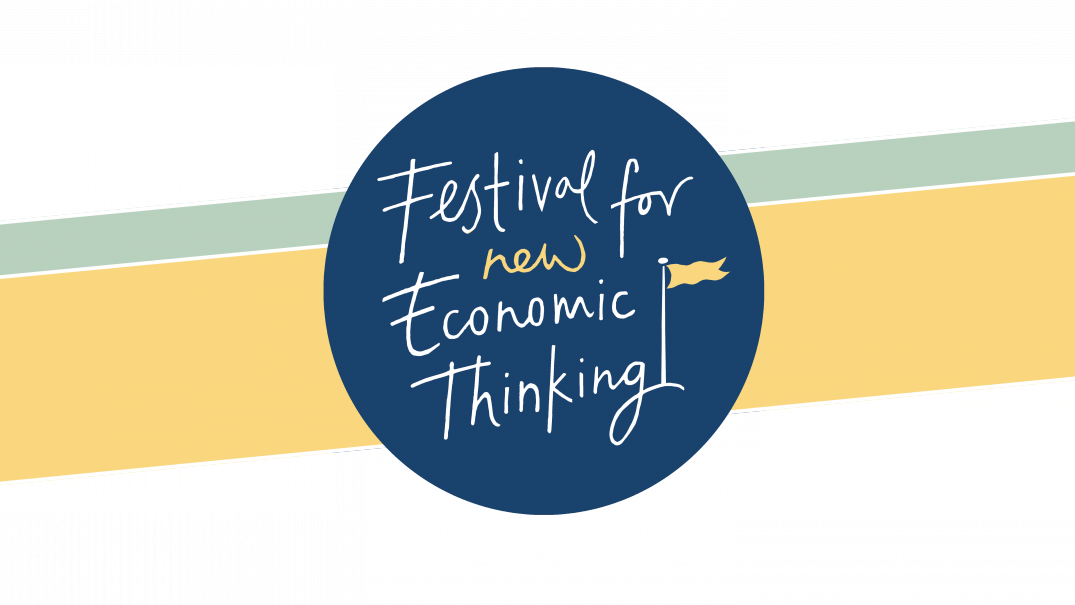
Last week openDemocracy attended the first ever Festival for New Economic Thinking which brought together people and organisations who are committed to advancing economic thought and inspiring change.
As part of the ‘Help the OECD write the new Narrative’ workshop, OECD official Patrick Love presented the organisation’s draft report ‘Towards a New Narrative’ in which 20 experts explain what was wrong with the OECD’s methods and advice from 2003 to 2008 and beyond.
The OECD (Organisation for Economic Co-operation and Development) has come in for rough criticism since the 2008 crisis in the way in which it has measured economic progress, market movements and growth. One example of the body rooting its research in flawed assumptions was a 2008 report that said that “a consensus had been secured that financial deregulation was an optimal contribution for economic development”, a comment that passed without further analysis.
Love suggested that both the tools economists used and way in which data was used has led to crisis the faith that institutions such as the OECD can effectively track economic behaviour. One particular macroeconomic tool for research used by treasury department’s, central banks, think tanks and academic institutions are DSGE models.
What are they?
For those of us who are not macroeconomists, DSGE stands for dynamic stochastic general equilibrium.
“General” indicates that the model includes all markets in the economy. “Equilibrium” points to the assumptions that supply and demand balance out rapidly and unfailingly, and that competition reigns in markets that are undisturbed by shortages, surpluses, or involuntary unemployment.
“Dynamic” means that the model looks at an economy over a period of time rather than in a single moment. “Stochastic” refers to a specific type of “manageable randomness” built into the model that allows for unexpected events, such as oil shocks or technological changes, but assumes that the model’s agents can assign a correct mathematical probability to such events.
The models attempt to explain economic growth, business cycles, and the effects of monetary and fiscal policy. They’re rooted in three ideas of how strategic choices in an economy are made:
First of all, they observe the behaviours and habits of “agents” be they consumers, companies, and financial institutions like banks or hedge funds. Secondly, the model takes into account the underlying economic environment of whether it is a competitive economy, how much monopoly power exists or any lack of information and transparency in what we may know. Finally, the model is estimated as a system, rather than equation by equation in the previous generations of macroeconomic models.
So what’s the problem?
Critics say that DSGE assessing an economy’s growth rate or how stable financial markets are based on unrealistic assumptions. They argue that it is fundamentally incorrect to model from individual actors because humans are first not rational and humans are not simply individual actors. The economics will always be flawed because such behaviour can only be understood in context of social interactions. Other suggest the opposite is true: there is too little individuality rather than too much.
Other problems cited is the idea of “general equilibrium.” This is an assumption that in an economy interaction of demand and supply will also level out. In the words of Patrick Love who authored a draft on reforming the OECD’s methods for economic measurements, “I think we need to come up with models that model behaviour, not models that assume that the system will always end at a stable equilibrium.”
Additionally DSGE models fail to look at labour costs, or details such as the relationship between profits and labour costs in order to predict the direction of the economy. In the run up to the 2008 financial crisis, the OECD models failed to take seriously the issue of lower wages combined with rampant household debt. Economists such as Love state that lower wages effectively kill jobs which runs contrary to mainstream assumptions of competition.
The issue of communication is also considered a major factor with communications networks and social media able to spread fear globally. The modelling tools economists used are as Andrew Haldane Chief Economist and Executive Director, Financial Stability, Bank of England said “incapable of capturing today’s networked world, in which social media shape expectations, shape behaviour and thus shape outcomes.”
Finally economic models face the danger of perpetual obsoleteness because of the failures in understanding accumulative affects of human behaviour. Where this evident is looking at the issue of emergence. Emergent phenomena occur when the overall effect of human individual behaviour is qualitatively different to what each separate human is doing. You can not anticipate the outcome for the whole system of an economy or predict what will happen based on a few individual agents because the large system may add properties that individuals do not have.
These models used to inform policy and analyse the economy are vast and complex with very few outside the world of economists knowing about or understanding them. Love questions whether it is necessary to have such complex tools if they fail to anticipate disasters or point to macro solutions.
The OECD is currently working on developing new models to analyse economic behaviour and as a result win back the trust and sense of accountability in itself as an institution. It wants to educate the public about economic models and the tools that economists and bodies use to predict, anticipate and fix an economy which has seen drastic mutation and left millions feeling increasing insecure. As Patrick Love said during yesterday’s session: “New economics requires new tools and narratives.”


